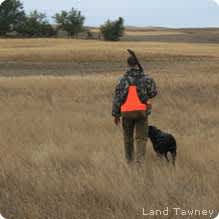Sportsmen Poll: Public Lands Protection Trumps Energy Production
OutdoorHub Contributors 09.25.12

A new national poll released today shows sportsmen prioritize protecting public lands above energy production. The poll conducted by Chesapeake Beach Consulting shows threats to America’s conservation heritage are priority issues for sportsmen, on par with gun rights.
“Hunters and anglers tend to be conservative politically, but many are split-ticket and independent voters. What’s clear from this poll is that sportsmen deeply value conservation and believe we have a moral responsibility to confront global warming to protect our children’s future,” said Bob Carpenter, president of Chesapeake Beach Consulting.
“Through shifting political winds, sportsmen have not flinched in their conservation values,” said Larry Schweiger, president and CEO of the National Wildlife Federation. “Candidates at all levels should answer this simple question: What’s your plan for protecting our outdoor heritage for our children’s future? These are ethics that sustain America’s wildlife, outdoor economy and healthy families.”
Among the poll’s key findings:
- Given a choice between protecting America’s public lands and prioritizing the production of oil, gas and coal, 49 percent want to protect public lands and just 35 percent choose fossil fuel production.
- Conservation is just as important as gun rights, according to nearly half (47 percent) of sportsmen polled. Another 13 percent believe conservation issues are even more important than gun rights.
- Supermajorities say Congress should update the 1872 Mining Law to ensure public lands are protected and royalties generated are used to clean up abandoned mines (82 percent favor) and restore Clean Water Act protections to wetlands and waterways, including smaller creeks and streams, to protect our health and important fish and wildlife habitat (79 percent favor).
- Two in three sportsmen polled (66 percent) believe we have a moral responsibility to confront global warming to protect our children’s future. Additionally, 69 percent agree the U.S. should reduce its carbon emissions that contribute to global warming and threaten fish and wildlife habitat.
- Sportsmen strongly believe BP should be held accountable and fined the maximum amount allowed for the 2010 Gulf oil disaster (81 percent) and that those funds should be used exclusively to restore the fish and wildlife habitat of the Gulf of Mexico and its fishing and hunting heritage and not for infrastructure projects such as roads, bridges, ports and convention centers (87 percent).
“The nation’s fishermen and hunters are in the frontline of our field naturalists. Doing what they love best they see firsthand the impact of climate change on natural systems and our wildlife. Their conclusions are based on observations made over years spent in the out of doors,” said sportsman and conservationist Theodore Roosevelt IV. “As poll shows, by substantial margins fisherman and hunters believe we have a moral responsibility to act as stewards to pass on to our children’s children our magnificent public lands and waters.”
Hunting and fishing are on the rise in America. From 2006 to 2011, hunting was up 9 percent and fishing is up 11 percent, according to a new U.S. Fish and Wildlife Service report. In all, over 37 million Americans took part in hunting, fishing or both, spending $90 billion.
“Protecting public lands and confronting climate change may not be priorities for political consultants in DC, but wildfires, drought, and extreme heat are threats to our way of life out west,” said Kathleen Hadley, Western Vice Chair of the National Wildlife Federation Board of Directors. “We can’t destroy America’s outdoor heritage and leave the mess for our children and grandchildren to clean up.”
“Sportsmen are on the front lines of global warming. From ducks short-stopping to cold-water fish stressed by rising water temperatures to coastal habitats being swallowed by sea level rise, we’re already seeing changes where we hunt and fish,” said Richard Mode, NWF affiliate representative from the North Carolina Wildlife Federation. “For those of us with boots on the ground, not in an office, these are literally kitchen table issues.”
Poll background:
This national public opinion poll conducted among 800 self-identified hunters and anglers was conducted by Chesapeake Beach Consulting from August 27 through September 1, 2012 for the National Wildlife Federation. The sample for this survey was randomly drawn from a list of self-identified hunters and anglers. To qualify, a respondent must have indicated they were a hunter, an angler or both as well as a registered voter. All interviews were conducted by telephone, including 15 percent of the interviews by cell phone. The margin of error for this study is plus or minus 3.2 percent at the 95 percent confidence level.

